“To Legalise or Not?”: Caye Caulker Decides Tomorrow
History will be made tomorrow in Caye Caulker as residents head to the polls to decide whether cannabis should be legalised for production and sale on the island. The long-awaited October 8 cannabis referendum will ask voters, “Should the Government of Belize pass legislation to create a responsible, regulated, and taxable legal cannabis industry on the island of Caye Caulker, with a portion of the revenue going directly for the benefit of Caye Caulker and its residents?”
Voters can answer “Yes” or “No.”
The referendum has divided the community, with strong resistance to the proposal. News 5’s recent Facebook poll found that 78% of respondents opposed legalisation, while 23% supported it.
For weeks leading up to this long-awaited cannabis referendum, campaigns have strengthened their stance and built strong opposing crowds.
Spearheading the pro-cannabis campaign is Councillor Ilya Rosado. He argues that legalisation could boost local revenue. “If the people are going to make this choice, then they deserve at least 50% of the revenue,” Rosado said. He says the revenue funds would support education, infrastructure, and healthcare advancements on the island.
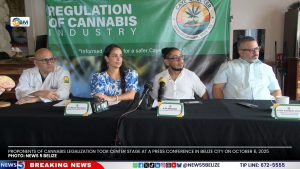
Proponents of cannabis legalization took center stage at a press conference in Belize City on October 6, 2025
“We have emergencies several times a year… We need necessities like an ambulance boat and a clinic with enough supplies to take care of people with chronic conditions. We don’t have this at the moment,” Rosado said at Monday’s Cannabis Conference.
Meanwhile, long-time resident Celina Fuentes, who is leading the ‘Hope Not Dope’ campaign, remains opposed to the proposal. She warns that street sales would not disappear, despite legalisation. “There will still be street vendors; we can’t stop that. In other countries that have legalised it, it’s still happening.” She said Caye Caulker is not ready for a turf war over territory.
On Saturday, the ‘Hope Not Dope’ campaign took to the streets of Caye Caulker, rallying against the legalisation of cannabis ahead of the referendum. Church members and residents from across the island, as well as Belize City and Belmopan, gathered to voice their opposition. One resident participating in the rally shared, “Well, I am a parent from this island; this is my home. I grew up here, and I have a son that was introduced to this, and there is a problem with the mental issue.”
During Monday’s Cannabis Conference, neurologist Dr. Joel Cervantes shared his perspective on medical use. He said, “I can say that there is a place for medical cannabis in Belize. We’re not the first country that’s going in this direction. We are at a disservice to ourselves if we don’t join this bandwagon, but it has to be done in a very regulated way.”
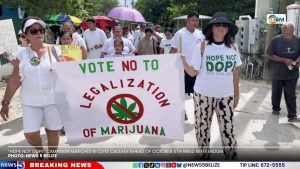
“Hope Not Dope” Campaign Marches in Caye Caulker Ahead of Weed Referendum
International cannabis advocate Lorena Beltran also spoke at the conference and said that countries which have legalised cannabis have seen a rise in tourism. She explained, “We know that where cannabis has been legalised in different countries, cities, and states, we’ve seen an increase in tourism.”
Beltran added that international studies have shown “no place, no city, no nothing where tourism decreased after regulation.” She said the industry has brought “economic impact and job opportunities in every place that this has been legalised.” Beltran noted that regulation must align with a country’s laws “in order to build a regulation that can fit that specific region or country where cannabis is going to be legalised.”
Meanwhile, according to statistics produced by the Ministry of Health and Wellness (MOHW) through the National Drug Abuse Control Council (NDACC), out of 342 individuals referred to outreach services for substance abuse treatment during 2024, more than 50%, or 181 individuals, “were struggling with alcohol abuse, while 32% (108) were struggling with marijuana abuse.”
The report further reported that processed cannabis was the most commonly seized type of drug in Belize during 2024, with a total of 732,957.22 grams confiscated.
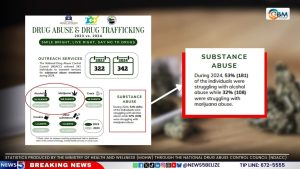
Statistics produced by the Ministry of Health and Wellness (MOHW) through the National Drug Abuse Control Council (NDACC)
With only hours to go, preparations for the referendum are already underway, and Chief Elections Officer Josephine Tamai says that the voting process will closely mirror that of general elections.
Three polling stations will open early, and trained public officers will facilitate both the voting and counting of ballots. Tamai stated that the poll will be closely monitored by non-political groups to ensure transparency and accountability.
Tamai explained, “We will be having monitors inside those polling stations to monitor the process in terms of ensuring that we have transparency and accountability in the electoral process.”
Polling takes place from 7 a.m. to 6 p.m. at the Caye Caulker R.C. School, where 1,454 registered voters are eligible to cast their ballots.
Tamai expects a quick count due to the island’s small size and reminded voters that their voices will only be heard if they participate.
”For persons who want to stay at home thinking that their voices will be heard, I want to encourage them to come out because that is the only way either your yes or no votes will be counted if you come out and cast your votes,” Tamai said.
Stay tuned to News 5 on October 8th for complete coverage of the historic cannabis referendum in Caye Caulker. Our theme, “Blunt Talk: Caye Caulker Decides,” will guide our special reports from the opening of the polls to the final count. News 5 will bring you real-time updates, on-the-ground interviews, and the official results.

“To Legalise or Not?”: Caye Caulker Decides Tomorrow




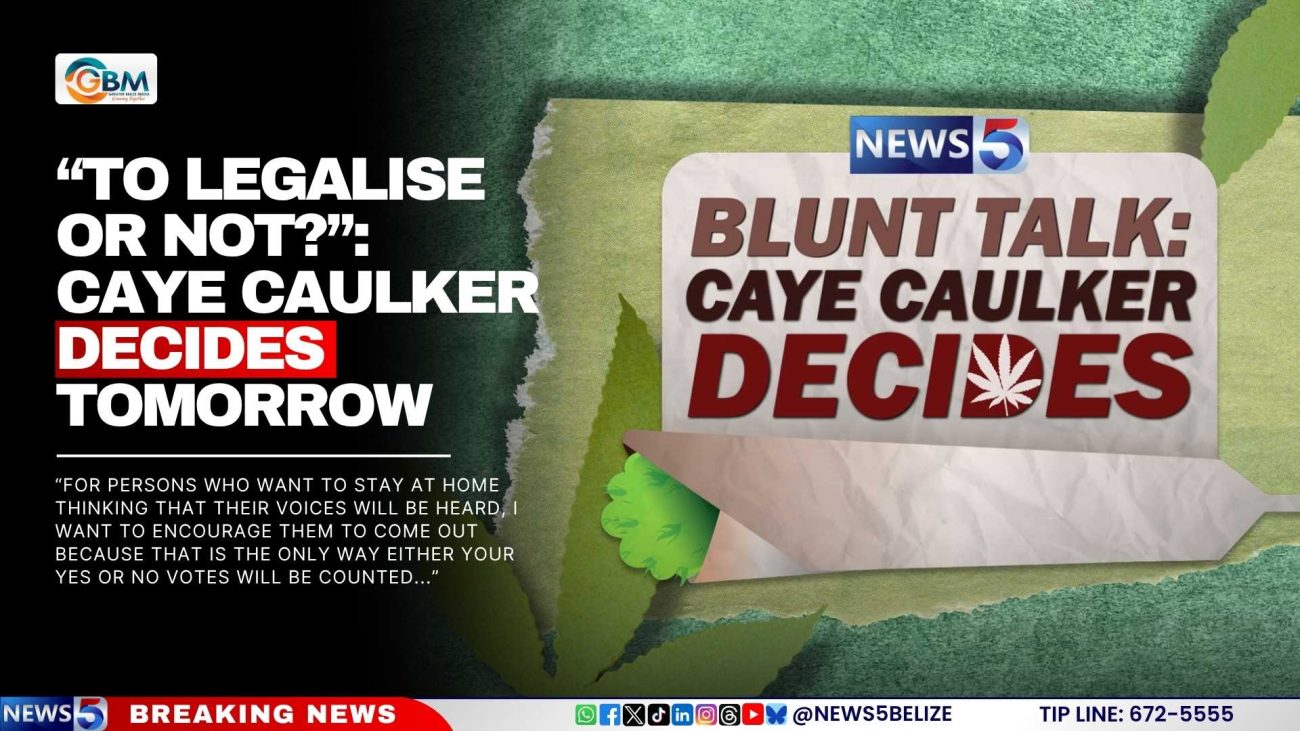
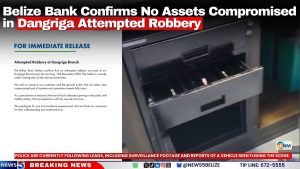
Facebook Comments